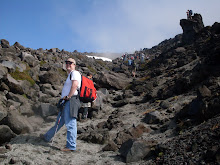Some science books are good because of the quality and quantity of the information. But in order for science book to be a compelling read for the lay person, it needs more to be a great book. Robert Hazen is not only a scientist; he is a story teller and he told a great story in his book Genesis: The Scientific Quest for Life's Origins. When he talks about his colleagues, it is with enough detail that you can visualize them as you read. The science is described in a logical building fashion, but the book also includes biographical elements of the researchers that draws in the reader. It includes conflict, rejection, and successes.
The current state of origins research has many good theories about how the raw building blocks of life can be created chemically, including cell membranes. Once RNA is created they know fairly well how these simple organisms evolved to what we see today. However there is a large gap between the building blocks and a microbe with RNA that is not well understood. There are several ideas, but so far they haven't been supported by experimental evidence.
One of the most compelling stories in the book relates how a grad student that worked in his lab came up with an idea on how RNA could be created. This particular student had been working on a PhD for almost five years. He was easily distracted by new concepts, so he hadn't made any progress. His visa was running out and he had no degree and no job lined up. Just a few short weeks before his scheduled defense, he came up with an intriguing proposal. After some late nights, he had fleshed the idea out, defended his dissertation, gotten his idea rejected for publication, and had a job lined up so that he could run the required experiments to prove or disprove his idea. The book was written a couple of years ago, so it might be worth doing a literature search to find out if there was any success or not.
It isn't often that science authors will use a cliff hanger as a literary device. Dr. Hazen was telling a story about his first foray into origins research. He described the hypothesis, the experimental setup, and then just before he got to the review of the results, he ended the chapter. I had to wait for several chapters before I learned the chemical make up of his brown goop.
Because the book discusses an interesting and not well known field of science and because of the compelling writing, I would rate this book as one of my five favorite science books. Of course I may have more than five books in my list of five favorite science book, but I would prefer not to quibble with such details.
Subscribe to:
Post Comments (Atom)

No comments:
Post a Comment